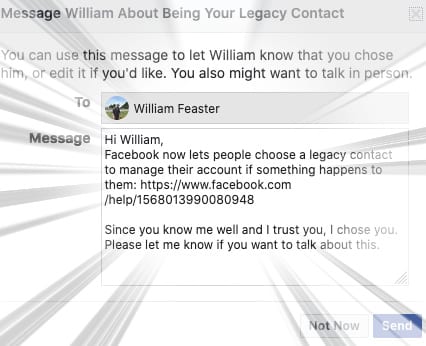I couldn’t let last weeks post go by and not have a bit more to say.
We hate to talk about death. Quite honestly the reality is that it is inevitable. And illness or injury is possible. We talk about so much else in our lives, but this is a conversation we shy away from. Let’s get our heads out of the sand and start talking.

Books like Elderhood and the Art of Dying Well address the challenges of aging and the ultimate outcome, death. What about other things like social media accounts?
We talk about retirement, taking it easy, our bucket lists and more. We use to enjoy a round of golf, cocktails with friends, cruises, or just watching TV until we can watch no more. We would post those images for our friends and family, now we are posting selfies of our latest face mask. Time ticks by and we will get back to our normal routine. Then the days, weeks, month and years will pass. But wait! Those pictures and posts – How will you social media get curated if you are ill or die.
Who will tend to your social media accounts?
What will happen to your Facebook account?
You have a few options: You can choose to either appoint a legacy contact to look after your memorialized account or have your account permanently deleted from Facebook. If you don’t choose to have your account permanently deleted, it will be memorialized if Facebook becomes aware of your passing. Hmmm…
What is a legacy contact? It is someone you choose to look after your account if it’s memorialized. If you add a legacy contact, that person will be able to make decisions about your account once it is memorialized. They are your proxy.
To add a legacy contact:
- Click
in the top right of Facebook and click Settings.
- Click Memorialization Settings.
- Type in a friend’s name in Choose a friend and click Add.
- To let your friend know they’re now your legacy contact, click Send.

To change or remove a legacy contact, follow steps 1–2 above, then click Remove. From there, you can add a new legacy contact if you’d like.
Instagram and Twitter
They have different rules and you will have to present certification of death to have the accounts memorialized or deleted. The rules are not the same as Facebook, even though Facebook owns Instagram. You can look the information up as it may change.

Passwords and other issues
Do you have a record of your accounts and websites that you use or subscribe to? You may be registered for various websites, apps, etc. Some may require payment and may automatically withdraw it from your credit cards (that’s another issue). Does your appointed proxy know where that information is kept? What if you are one of those people that love very obscure passwords or even if you use password as your password. Where is the information? Do you have a password keeper on your phone or a list somewhere? Who knows where it is kept?
Speaking of phones, can someone unlock your phone, know the ID. If you are used to touch ID, remember that your proxy does not share your thumbprint.
Please, save the person that will help in case you can’t from the stress of trying to figure things out. Make a plan and communicate these issues, so they don’t have go on an archeological dig.
Minimize the guesswork for your loved ones
So why am I being so grim? The way I look at it is more pragmatic. I don’t want someone to go through the hassle of trying to guess what I was thinking. That never works.
Also, life doesn’t always go so smoothly or as we expect. We are learning this very quickly with COVID-19. So write it down and communicate to the person that is your delegate. They will thank you.
